Introduction
Before jumping on to the FRM course duration let’s have a quick introduction to FRM. The Financial Risk Manager (FRM) designation is the most respected and sought-after professional certification in the finance industry. It is provided by the Global Association of Risk Professionals (GARP), an independent education provider that provides courses to help professionals assess and manage enterprise risk.
FRMs must complete two levels of study to earn their certification: FRM Part I and FRM Part II. GARP provides an official curriculum for both exams, which are standardized according to a set of learning objectives that are reviewed annually. The goal is to ensure that those who pursue the FRM designation stay current on the latest financial practices and theories.
FRM Course Duration
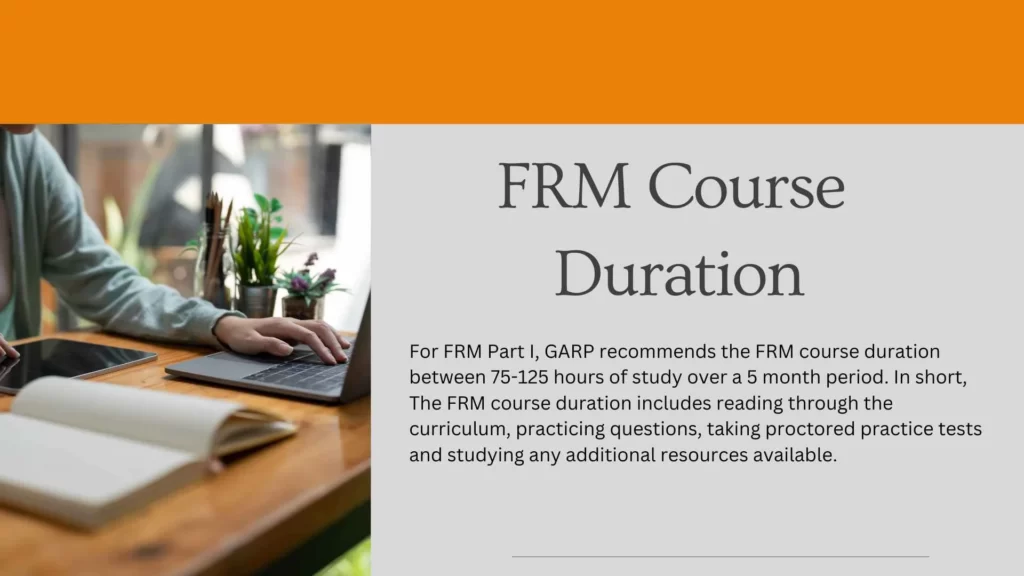
So how long is the FRM course duration? While the FRM course duration largely depends on an individual’s learning style and study habits, there are some general guidelines for each level of study:
For FRM Part I, GARP recommends the FRM course duration between 75-125 hours of study over a 5-month period. In short, The FRM course duration includes reading through the curriculum, practising questions, taking proctored practice tests and studying any additional resources available. The FRM course duration in Part I is focused on providing you with a strong foundation in finance, accounting, economics, quantitative analysis and risk management techniques.
The Part I FRM course duration generally takes 24 months to complete and may require between 4060 hours of study per week to master all of the material. Typically, it is recommended that you take a few practice tests or sample questions before enrolling in the course in order to gauge your current level of knowledge and prepare for the examinations.
FRM Part II requires more intensive preparation as it covers more advanced topics relating to financial risk management. GARP recommends 150 – 200 hours or more of focused study over a 6-month FRM course duration leading up to the exam date (in addition to regular review of past materials). Additionally, part II requires candidates to understand challenging concepts such as VaR calculations and stress testing methods in great detail.
Part II examination covers more advanced topics such as credit risk management, market risk management and operational risk management. This exam is typically more difficult than the first and requires a greater time commitment to ensure success; most people find they need 68 months of studying as an average FRM course duration (around 3040 hours per week) in order to adequately prepare for this important assessment. Once both parts have been completed successfully you will have obtained your certification as a Financial Risk Manager (FRM). But this FRM course duration is just a guess.
By understanding the FRM course duration of each part of the FRM certification course, you can plan your study schedule accordingly and be set up for success on these rigorous exams!
Give a visit to the best PG Program In Investment Banking
Eligibility Criteria for FRM Course

Are you considering taking the Financial Risk Manager (FRM) course? This is a great way to obtain a level of expertise that is highly sought after in the financial sector and can help you pivot your career into the management of risk. Now, That you are clear with the FRM course duration it’s important to understand the eligibility criteria for the course, and what you may need in terms of professional experience or education.
For starters, the FRM course duration is that you must have at least two years of professional experience in fields related to financial risk management before you can sit for the FRM exam. As you know that the exam consists of two 4-hour parts, Part 1 and Part 2. In order to register for the exam itself, you will need to pay an exam fee and submit your proof of work experience.
In terms of educational qualifications, having a bachelor’s degree from an accredited college or university would be beneficial, but it is not required. If you don’t have a degree, then a combination of work experience and additional formal training will stand in place as your “educational foundation” when applying for FRM certification.
The FRM course duration itself depends on how much time and effort has been devoted towards studying the material required to pass each part of the FRM exam. It is recommended that a minimum study time frame should be around 200 hours per part this timeframe will vary based on individual preparation styles so plan accordingly!
Aspiring professionals who take on this challenge should ensure they prepare thoroughly by using high-quality study materials such as textbooks and online resources available from educational providers globally as well as practice tests which are also widely available such tools are essential for successfully passing both parts of this examination!
Syllabus and Subjects for FRM
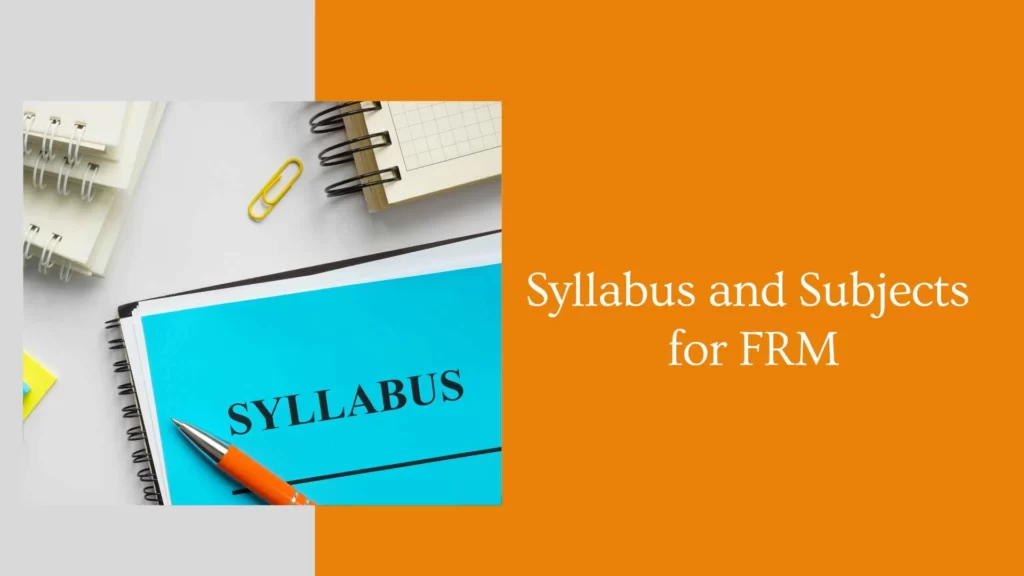
The FRM course duration in order to complete this certification requires around 80 hours of study time, so it pays to understand the scope of work.
The FRM syllabus is divided into two parts covering five core topics: Foundations of Risk Management, Quantitative Analysis, Financial Markets and Products, Valuation and Risk Models, and Contemporary Issues in Financial Markets.
These five topics represent the core FRM course curriculum that you’ll need to study in order to pass the exam within the FRM course duration to pass these exams. Each part covers different material; for instance, the first part focuses on understanding the foundations of risk management while the second part delves into quantitative analysis and financial markets.
In order to get a better understanding of all these topics, you need to attend classes on a regular basis to acquire knowledge in each section. Furthermore, completing practice exams can help ensure you have grasped all the concepts covered in each subject before attempting the actual exam. Also, keep in mind that some topics may be more challenging than others due to their complexity; therefore you must dedicate enough time to learn those specific subjects in greater detail.
It’s clear that such an extended preparation period can be quite demanding; however, with dedication and perseverance, it is possible to pass the FRM Exam with success! Taking advantage of available resources such as sample papers or online lessons can be very useful when studying for this challenging exam; so make sure you use them to your advantage during your long-term preparation process!
You may be wondering apart from the FRM course duration how much time is required to prepare for the FRM exam? Well, it is recommended that candidates devote at least 80 hours over a lengthy exam preparation period typically 4 – 6 months in order to properly cover all 5 topics and solidify their knowledge base. As an aspirant FRM candidate, it is essential that you create a timetable for yourself utilizing resources such as textbooks or online courses that provide structure for your studies.
Finally, it’s important to remember that your success depends on how well prepared – both mentally and academically – you are when taking this professional qualification test. This means making sure you keep up with any changes to the syllabus and subject matter as well as giving yourself ample time for studying each topic area prior to sitting for your exams. Best of luck!
Give a visit to the best PG Program In Financial Modelling
FRM Course fees
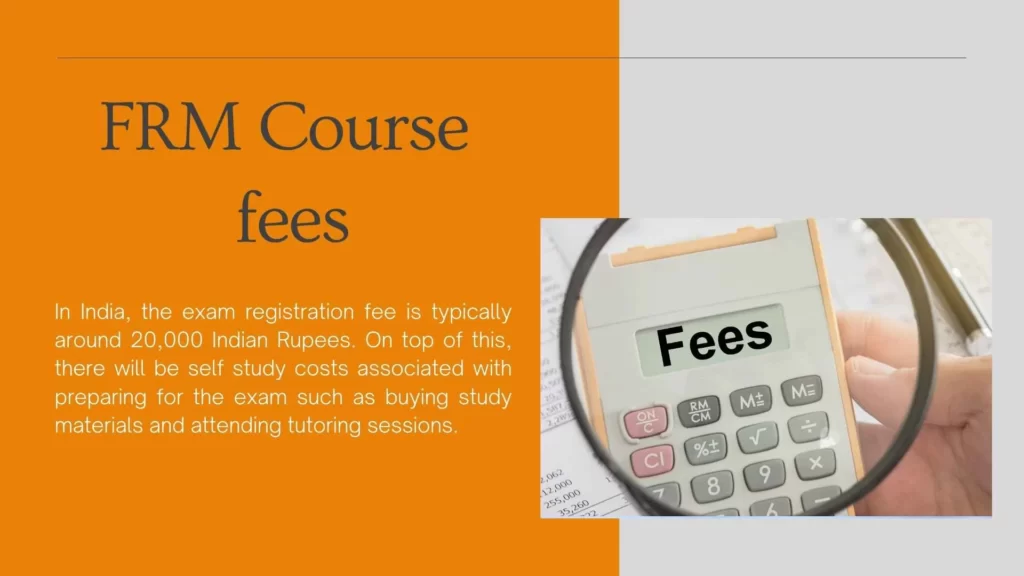
Understanding the FRM course duration, fees and levels can help you decide if the Financial Risk Manager (FRM) designation is right for you. It is a rigorous certification to obtain, but many professionals in the risk management field find that obtaining their FRM certificate is well worth it.
One of the first questions that often comes up when considering an FRM course is what are the fees? In India, the exam registration fee is typically around 20,000 Indian Rupees. On top of this, there will be self-study costs associated with preparing for the exam such as buying study materials and attending tutoring sessions. These expenses can vary depending on how you choose to study and which materials you select.
For example, purchasing a prep course can significantly increase your study costs but may lead to better preparation and higher exam scores.
In addition to monetary costs, FRM courses also require a time commitment depending on which program you choose to follow. Generally speaking, most courses range from 10-15 weeks or 200 hours of time spent studying in order to be adequately prepared for the exam. This includes reading material, attending webinars or other tutoring sessions, taking practice exams and any supplementary activities recommended by your tutors or instructor.
Fortunately, there are many options available to students attempting their FRM certification in terms of costs associated with the completion of the required coursework. Many online courses offer discounts or even free trial periods that allow entrants to get an understanding of different details they need to know before committing any funds towards the completion of their certification.
Additionally, corporate-sponsored programs may provide discounts on fees associated with completion as well as access to materials needed for the successful completion of exams. Finally, there are often scholarships or grants available through universities that may help defray some or all costs associated with obtaining your FRM certification.
Overall, preparing for your FRM certification requires careful consideration when it comes to the fees involved in completing both exam registration and coursework requirements. Taking advantage of various opportunities such as discounts, corporate-sponsored programs, and scholarships/grants can help make obtaining your certification more affordable for those looking to advance their career path in the finance and risk management industries.
To summarize, when it comes to taking an FRM course in India it’s important to consider your budget for both fees and self-study costs as well as review how much time you are willing to commit during the duration of your program. Doing so will help ensure that you maximize the value of your investment while increasing your chances of successfully obtaining a Financial Risk Manager certification.
Best online FRM Courses in India
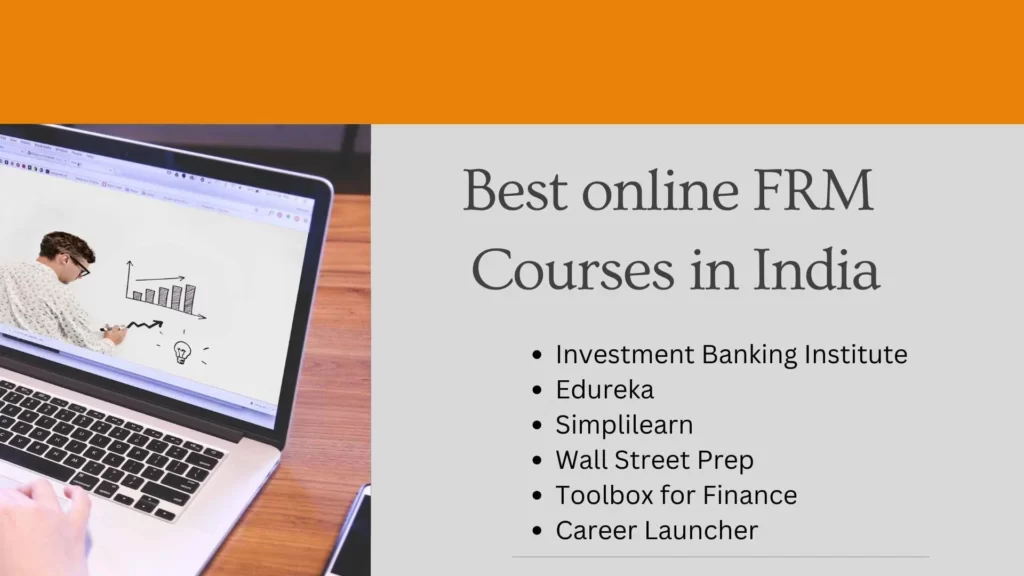
Are you looking for the best online FRM course in India? If so, you’ve come to the right place! This part will help you identify the top 10 online FRM courses available in India and their FRM course duration.
For those who are interested in becoming a Financial Risk Manager, the Financial Risk Manager (FRM) certification is vital. It is an internationally recognized professional designation that provides an in-depth understanding of global financial markets, financial instruments, and risk management techniques. To obtain this certificate, an aspiring FRM must take part in a rigorous examination conducted by the Global Association of Risk Professionals (GARP).
- Investment Banking Institute: This institute offers both self-paced and instructor-led FRM courses and their FRM course duration lasts anywhere from 4 to 8 weeks depending on the course chosen.
- Edureka: Powered by experts from finance companies such as Goldman Sachs and Morgan Stanley, Edureka offers both Beginner and Advanced level FRM courses that cover topics such as financial products, portfolio management, derivatives pricing, and more. Their FRM course duration can last up to 8 weeks with dedicated instructor-led guidance provided every step of the way.
- Simplilearn: Simplilearn provides both Part I and II of GARP’s official curriculum for their FRM program. The FRM course duration is 5 months for the completion of each module. They also provide other helpful resources including study plans to help candidates better organize their preparation process accordingly.
- Wall Street Prep: This highly rated course offers an extensive program based on topics such as quantitative analysis, accounting and finance, corporate finance, derivatives, and more. They also provide guidance through self-paced classes and one on one coaching sessions with professional instructors. Their FRM course duration varies from one course to another.
- Toolbox for Finance: This course provides students with a combination of lectures as well as individualized tutoring from experienced professionals via video calls. It also covers topics such as financial markets, market and credit risk management, insurance products, capital budgeting techniques and more. Their FRM course duration is also between 4-8 weeks.
- Career Launcher: This program provides students with videos, practice tests and other study materials which give them hands-on experience when preparing for an FRM exam. Their FRM course duration is for 6 months and is priced at Rs 35,000. It also offers helpful support teams who are available 24/7 to answer any questions or queries related to an FRM syllabus or topic area.
- NSE Academy’s Financial Risk Manager Program: This course was designed by the National Stock Exchange of India (NSE), and students learn about fixed-income securities, derivative pricing models and interest rate curves from industry experts and certified professionals through online webinars. Their FRM course duration is for 5 months with the certificate valid for a lifetime.
- IIMA’s Online Financial Risk Management Course: The Indian Institute of Management Ahmedabad (IIMA) offers an online Financial Risk Manager (FRM) course that is suited for both business professionals and academics alike. The FRM course duration is of 16 weeks and covers topics such as credit risk management, equity & derivatives markets, investment banking, portfolio management techniques, balance sheet analysis and forex trading & hedging techniques.
- NISM Investment Consultant Certification Program: This is another popular choice among professionals who are looking to pursue a career in financial risk management. The National Institute of Securities Markers (NISM) offers an Investment Consultant Certification Program which provides intensive training in various aspects related to investments and capital markets such as securities market regulations & policies, investment products & fundamentals, portfolio construction & evaluation techniques & more. Participants can take this program online as the FRM course duration is for 12 weeks with modules spread across 4 different cycles.
- Lastly, we have Edupristine’s FRM Beginner’s Certification Course. This course provides you with a detailed overview of financial risk management concepts and tools in both online classroom lectures as well as self-paced video lessons; practice questions and live mock tests are also provided for further practice before taking the exam. Their FRM course duration is about 60 hours long in total.
Give a visit to the best investment banking courses
Salary of an FRM Graduate
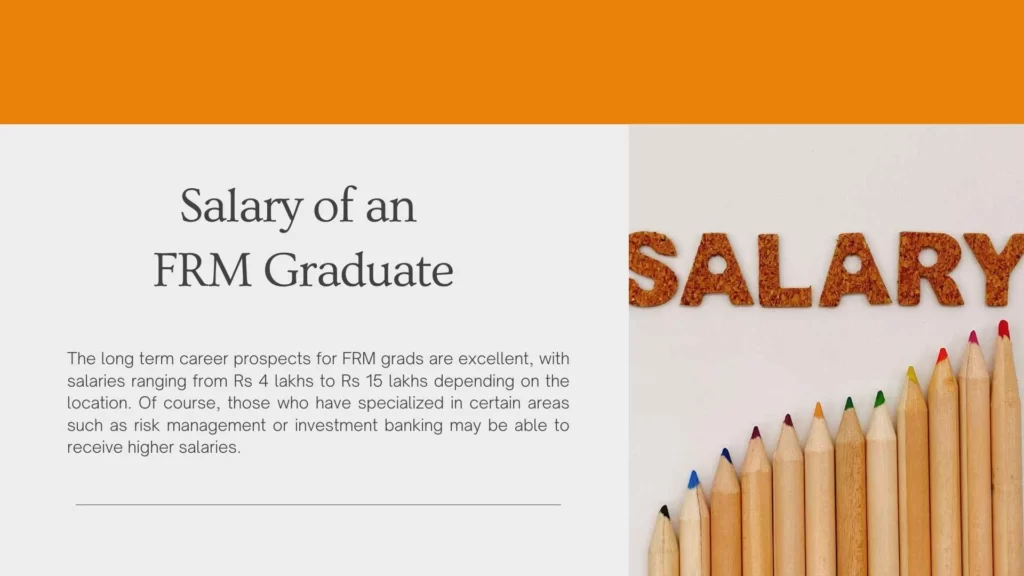
Are you a recent FRM graduate looking to get an idea of the salary you can expect to receive in the finance industry? In India, the salary for an FRM Graduate reflects the number of years of experience, qualifications and skills. The long-term career prospects for FRM grads are excellent, with salaries ranging from Rs 4 lakhs to Rs 15 lakhs depending on the location. Of course, those who have specialized in certain areas such as risk management or investment banking may be able to receive higher salaries.
The FRM course duration also affects a graduate’s salary. Many universities offer online or part-time FRM course duration that can be completed in about 18 months. Those opting for a more comprehensive program such as offered by GARP can require up to 3 years of study. But these courses are comprehensive and provide graduates with on-the-job training that is invaluable in gaining employment within the financial sector.
It is important to remember that those holding an FRM qualification enjoy high levels of respect within their field, along with access to many interesting and challenging jobs with some of the biggest names in finance and banking. Along with this comes a competitive salary package that will give graduates opportunities for promotion and further advancement into senior positions within their organization.
At the end of the day, it is down to each individual graduate’s qualifications and experience that determine their starting salary after completing their FRM course. With hard work, dedication and continuous learning, an FRM graduate can look forward to a well-paying career in finance while making positive changes within their sector by applying principles studied during their FRM studies.
Job roles after Completing an FRM course

Completing an FRM course within the FRM course duration is a great way to boost your career prospects and gain an in-depth understanding of financial risk management. It can open up a variety of job roles and long-term career outlooks. But what kind of job roles could you expect to get after taking an FRM course?
The Financial Risk Manager (FRM) is the most obvious role that comes with completing the FRM course, and involves taking responsibility for managing financial risks at a firm. They play an important role in ensuring regulatory compliance and identifying risks. As an FRM, you will be expected to create risk management plans, assess the effectiveness of current risk management policies, update financial models, and present reports to senior leadership.
In addition to taking on the FRM role, there are a variety of other job roles that you may be able to pursue after completing the FRM course. These include Financial Analysts, Credit Officers, Risk Managers, Operational Risk Managers and Senior Risk Managers. All these roles involve assessing financial data and making decisions about how best to mitigate risks.
The long term career outlooks for someone who has completed an FRM course are particularly positive. As more companies become aware of the importance of mitigating financial risk, there will be increased demand for highly trained professionals who understand how to do this effectively. This means that your skills would be in high demand for many years to come!
Another major pro of taking an FRM course is that it meets many regulatory requirements around financial risk management – something which is becoming increasingly important due to stricter rules and regulations being put in place by governments across the globe.
Conclusion
The scope of Financial Risk Management (FRM) in India has become increasingly advantageous in the business world today. Although this degree is relatively new in India, it is gaining immense popularity for its broad range of skills and knowledge that are beneficial for a career as a risk analyst. FRM courses in India are highly sought after by students to gain insight into the world of finance and financial risk management.
Well, the scope of FRM covers a wide range of topics such as derivatives, capital markets, liquidity risk management and more. It also includes topics related to quantitative analysis, regulation and compliance, data analysis and reporting. All these topics can be studied through various online or offline programs offered by universities across India.
This degree program can be completed within two years or four semesters if opted for regular classes. For those who prefer pursuing an online course, the FRM course duration may vary depending on the university’s curriculum rules but could easily be done within one year or less. The advantage with this degree program is that one can pick up specialized skills needed to progress further in their career as a financial risk analyst without having to spend too much time on traditional courses such as accounting or finance degrees.
Once you have completed your FRM course in India, there are plenty of attractive job opportunities available across different industries such as banking and finance institutions, insurance companies and more. This degree will help you acquire the necessary skills required to work within the industry by identifying potential risks associated with any particular situation and suggesting ways to mitigate them effectively.
Frequently Asked Questions
Following are some of the Course Details
Average Fees-INR 1 LPA
FRM course duration- 1 Year
Age- No Age Limit
The FRM course duration might take some good time. So, I recommend dedicating at least 200 hours (roughly two hours each day for three months) to studying. If you have prior experience with math and/or risk management, you may require fewer hours. However, if you lack experience in both of these areas, I highly suggest devoting at least 200 hours for an FRM course duration.
Anyone who has started an undergraduate degree can take the FRM Exam Part I. To be eligible for FRM Exam Part II, you must have completed your undergraduate degree.
Anyone can sign up to take the FRM Exam. The certification is given after a person passes two multiple-choice tests (FRM Exam Part I and Part II) and has two years of relevant work experience.
Is the FRM certification harder than an MBA? An MBA is a rigorous two-year program that includes internships and exams. However, passing the FRM certification requires even more dedication and hard work.
The average starting salary for Financial Risk Managers in India is about 1.7 lakh rupees annually, which works out to be 14,200 rupees per month.
CFA is a better fit for students with an investment background because the curriculum focuses on investment and market fundamentals. FRM is more suitable for those who have a quantitative background, as it consists mainly of statistical and mathematical concepts.
Financial Risk Management not only helps you gain essential skills but also provides valuable practical knowledge that can lead to financial growth. Possible designations for a Financial Risk Manager include Head of Operational Risk and Senior Risk Analyst.
If you have a Financial Risk Management (FRM) certification, it shows employers that you have the knowledge and skills needed to work in the financial risk management industry. This certification gives you an advantage when looking for job opportunities.
People who have been certified as Financial Risk Managers (FRMs) typically work in positions such as risk analyst, risk manager, credit risk analyst, market risk analyst, regulatory risk analyst, operational risk manager or chief risk officer.





